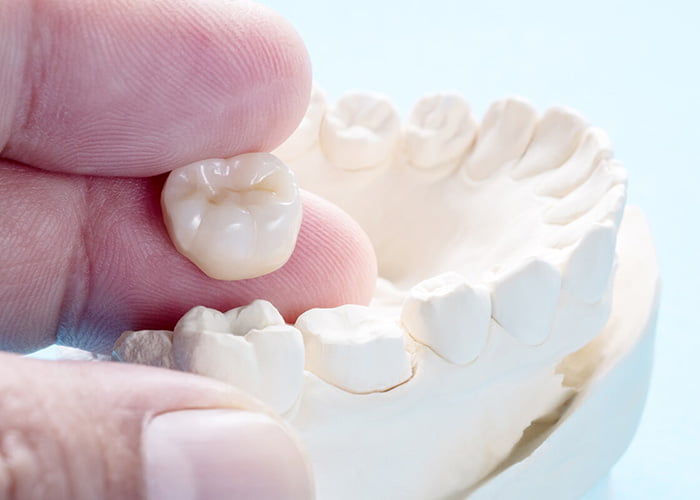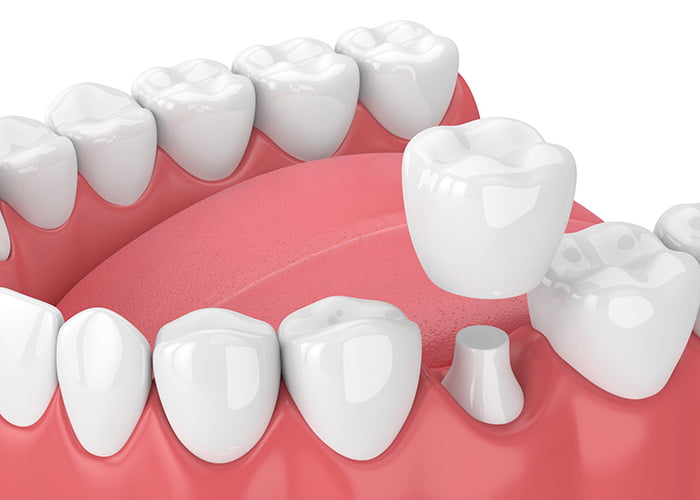You can still have an impressive smile despite having decayed, damaged, or missing teeth. A dental crown may be an alternative to fillings or veneers when they are insufficient to improve your smile. When compared to the alternatives, a dental crown is a very successful restoration method used to repair a tooth that has been injured in some way. To choose the best course of treatment for each patient, it is important to take into account the pros and cons of a dental crowns as well.
What are Dental Crowns?
A dental crown is a cap-like covering for your teeth that can be used for aesthetic or restorative purposes. Your dentist cleans the area around your tooth to prepare it. This makes room on your existing tooth for the crown to fit. A replacement crown is fabricated using an impression of your teeth. The crown must be cemented as the last stage.
Typically, two consultations are required to finish the dental crown treatment. Your mouth will be x-rayed on the initial visit in order to obtain a clear image of the tooth and the surrounding bone. You might require a root canal if there is an infection or tooth decay. The dentist will then make the injured tooth smaller. Following that, an impression will be made in order to precisely sculpt your mouth. A porcelain or ceramic dental crown is created to closely resemble your actual teeth in terms of size, form, and color. While their permanent crown or bridge is being manufactured, the majority of people must wear a temporary one. Once the crown is ready, it will be placed over what remains of your tooth and cemented in place.
Advantages of Dental Crowns
A dental crown is chosen by many people as the method to improve their oral condition because of the benefits listed below.
Can be formed to natural tooth shapes
The first benefit of dental crowns is they can be formed into natural tooth shapes. The natural root of the tooth is capped and covered with porcelain. Fortunately, porcelain may be shaped to resemble a person’s actual teeth and improve their smile. For e front teeth in the mouth, porcelain crowns are often advised. Furthermore, it has previously been established that dental crowns can be bought by dentists using porcelain or ceramic. These materials not only have the ability to whiten discolored teeth, but they also resist stains, which help you avoid discoloration as you age.

No allergic reactions
Porcelain crowns are produced from a substance that is thought to be biocompatible. As a result, it is not feasible for someone to react allergically to the substance. Porcelain crowns are an option for those who are more susceptible to allergies and can allay any fears of an allergic reaction. Crowns outlast the majority of other dental procedures! Halting additional decay or deterioration-related harm to your teeth can be quite beneficial.
See more: The pros and cons of a dental bridge
Disadvantages of Dental Crowns
Dental crowns have various drawbacks in addition to their advantages, like any operation.
Porcelain can be fragile
If bitten on forcefully, the fragile porcelain material may break or chip. Even though all-porcelain crowns are not frequently chosen for teeth that are primarily utilized for chewing in the back of the mouth, being aware of when to relax is crucial. The price of crowns may be a drawback. The typical cost is roughly $1000, although there are many variables to consider, including the type of crown and the procedures required. It will depend on your requirements because every person’s mouth is unique. But insurance frequently comes in handy. For more information on what is and isn’t covered in relation to dental crowns, consult your provider and policy.
The original tooth is ground away more
The tooth may be ground as one method of getting it ready for the crown to be placed. The tooth must be ground more than with other choices in order to accommodate porcelain crowns. This means that if a tooth is filled too thinly, there is a chance of nerve injury. In this situation, root canal therapy is a possibility; in the worst scenarios, total nerve excision may be required. But before filing, your dentist will always perform a complete examination to make sure your tooth can hold the crown.
Read more: Dental crown repair in Dentist For Life
Can cause an increase in hot and cold sensitivity
If a dental crown is too abrasive, it might potentially harm neighboring teeth. It could cause pain or even harm to neighboring or opposing teeth by wearing them down. Tell your dentist right away if you experience any pain or discomfort near your crown.
Contact Us
A dental crown may be the best option to restore your teeth and restore your ideal smile if you are unhappy with a cracked, chipped, or discolored tooth, or if you have an outdated or broken restoration. You can select the best course of therapy with the assistance of a consultation with our expert. Contact us via the website Dentist For Life to get the best advice.
Conclusion
Dental crowns are a good way to improve your oral health. However, you need to know the pros and cons of a dental crown to be able to make the best decision. Hope the article was able to provide you with useful information.



